

|
|
Study, work or travel in the UK. British
culture and life.
|
|
||
|
|
|
|
||
 |
||||
|
|
|
|
||
|
|
||||
 |
||||
|
British pubs and drinks
|
||||
|
Sections:
|
Introduction |
 |
| Beer | ||
| Other alcoholic drinks | ||
| Soft drinks | ||
| Bar food | ||
| Typical expressions | ||
| Pub etiquette | ||
| Pub names | ||
| Further information | ||
| Links | ||
|
Related pages:
|
Meals (British eating habits) | |
| Products (types of British food) |
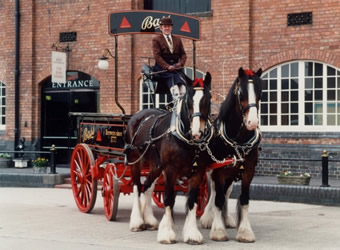 Bass Museum, Burton-on-Trent, Staffordshire |
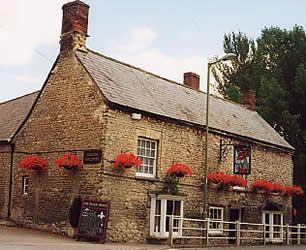 Country pub |
Pubs are where many British people meet to talk and have a drink. This page
explains pub vocabulary and customs.
 |
The
Good Beer Guide 2007 Editor: Roger Protz Publisher: CAMRA (Campaign For Real Ale) Books Date: September 2006 |
 |
The
Good Pub Guide 2007 Editor: Alisdair Aird, Fiona Stapley Publisher: Ebury Press Date: September 2006 |
 |
"Time
Out" London Bars, Clubs and Pubs 2006/7 Publisher: Time Out Magazine Date: April 2006 2007/8 edition (published May 2007) |
 |
Pubs
and Inns of England and Wales Editor: David Hancock Publisher: Alastair Sawday Publishing Date: April 2005 |
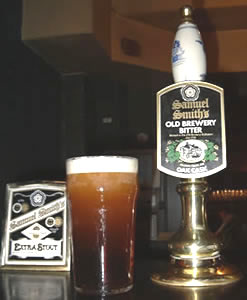 Pint of English bitter |
Bitter is traditional British beer (also known
as ale). It is quite strong and leaves a bitter taste in your mouth
after drinking. It is usually served at room temperature.. Light ales
(or mild brews), contain fewer hops and are less alcoholic; these
are popular in central and north-eastern England. Strong ales have
a high alcoholic content and a strong flavour. Real ale is a term
used for a beer which brewed from natural ingredients (hops, malted barley,
yeast and pure water) and stored in a wooden barrel (a cask) until
it is served. For more information, see the website of CAMRA (the Campaign
for Real Ale): http://www.camra.org.uk.
|
Stout is dark brown (almost black) and tastes a little bitter. The most popular example is the Irish drink called Guinness. You may need to wait some time for this drink. Do not be surprised if the barman starts serving someone else before finishing pouring your drink.
Lager is a lighter-coloured type of imported beer, and is normally served
cold. Examples are Fosters Ice, Stella Artois or Becks.
When you order a drink, don't just ask for a glass of beer: ask for bitter,
stout or lager, or ask for a particular brand name.
State if you want a pint or a half pint (if you don't say, it
will be assumed that you want a pint). A pint is about half a litre.
There may be a choice between bottled beer or draught beer (served
by tap from a barrel).
Shandy is a mixture of beer and lemonade - you should ask either a lager
shandy or a bitter shandy.
Root beer is an American drink which is not usually served in the UK.
Ginger beer and ginger ale are the names of soft drinks - they
aren't beers.
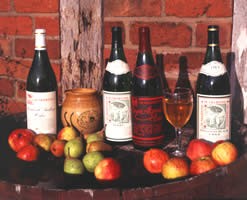 Herefordshire Cider |
Wine is an increasingly popular drink in the UK
and can be bought in pubs as well as in wine bars, although the choice
in pubs may be limited. The most common option is to ask for a glass of
the house wine (red or white).
Cider is a traditional English alcoholic drink made from apples. It is also known as scrumpy. It may be sweet or dry. You normally order a pint or half pint of cider. Whisky is a strong drink produced in Scotland and in Ireland. It can be served on the rocks (with ice). You normally order a shot of whisky in England and Wales, or a dram in Scotland (US measures such as a jigger or gill are not used in the UK). The volume of whisky used for this measure can vary from one place to another, but must be shown on a sign in the pub (it is normally a multiple of 5ml). |
Alcopops are bottled drinks which may taste of lemonade but are actually
alcoholic. Examples are a Smirnoff Ice or a Bacardi Breezer.
Drinks are often mixed (known as a cocktail). For example, common mixed
drinks are:
Gin and tonic; Whisky and coke; Rum and coke; Vodka
and orange; Vodka and tonic; Bloody Mary (this is vodka and
tomato juice)
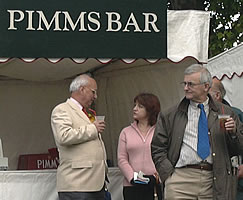 |
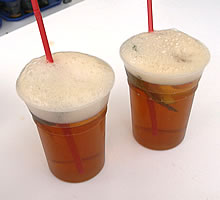 |
In summertime a popular drink is Pimms and lemonade.
This is a traditional cocktail of either Pimms Number 1 (based on gin)
or Pimms Number 6 (based on vodka) together with ice, citrus fruits (lemon/orange/lime)
and lemonade/ginger ale.
|
Non-alcholic drinks are known as soft drinks.
Soft drinks may be still (not fizzy) or sparkling (fizzy
or carbonated).
Popular still drinks include still mineral water and fruit juices
(especially apple, orange or pineapple juice).
Tomato juice is sometimes served with tobasco sauce or Worcester
sauce.
The most popular sparkling drinks is Coke or Diet Coke (you may
get either Coke or Pepsi when you ask for this).
If you ask for lemonade in a pub you will get the fizzy drink (in the
US, lemonade is still and pop is fizzy).
Bitter lemon is a similar drink that you can order which is served from
a small bottle.
Ginger beer (eg Canada Dry) or ginger ale are not alcoholic, despite
the sound of the names.
Other sparkling fruit drinks include Appletize or Orangina.
Sparkling mineral water (eg Perrier) or a tonic water (eg Schweppes)
are also available.
Most pubs can serve a hot drink such as tea or coffee.
They don't usually offer many different types.
Sometimes people who are with you may try to encourage you to drink alcohol,
to have more or stronger drinks than you want.
Try not to feel pressure to follow others - your friends and colleagues should
respect your right to make your own choices.
Back to top
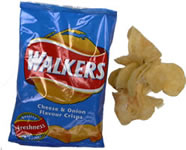 Cheese & onion crisps |
It is common to ask for snacks to eat with your drink.
Common snacks are crisps (known as potato chips or chips
in American English), peanuts and pork scratchings. The
most common flavours of crisps are ready salted (plain), cheese
and onion and salt and vinegar. Other flavours include smoky
bacon and beef & mustard. Peanuts may be dry roasted
or ready salted.
|
To order a meal in a pub (known as a pub lunch or a bar meal),
you usually have to find a table, go to the bar (sometimes there is a separate
counter for ordering meals), and to tell them where you are sitting (if there
is a number on the table you need to give this).
Sometimes they will give you a numbered ticket instead; in this case you have
to go to this counter to collect your food when they call out your number.
Many pubs do not serve meals late at night, so check what time they stop.
After leaving the pub, some people like to go out to eat a curry or kebab
or other meal at a late-opening restaurant.
Back to top
Below are some examples of some typical expressions which you might hear or
want to say when you go to a pub.
Asking someone to go out for a drink with you:
"Would you like to come out for a beer?" or "Shall we go for
a drink after class/after work?"
Asking if you can buy a drink for someone:
"Do you want a drink?" or "What would you like to drink?"
(quite formal)
"What are you having?" or "What can I get you?" (less formal)
"Would you like another drink?" (if the person has already finished
a drink)
Replying to someone's offer to buy you a drink:
"Can I have the same again, please?" (if the person who is offering
knows what you have been drinking)
"A pint of lager, please" or "Could you get me a vodka and orange?"
(specifying a particular drink)
"I'm fine, thank you" (this means you don't want another drink)
"I'm fine at the moment, thank you" (this means that you not want
another drink until later)
What the barman or barmaid might say to you:
"What can I get you?" or "Ice and lemon?" or "Anything
else?"
What you may ask the barman or barmaid:
"Hello. Two pints of lager, a Tetley's Bitter and a packet of cheese and
onion crisps, please"
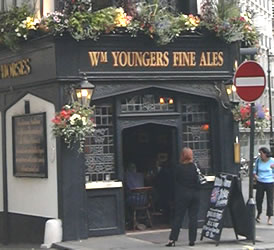 Pub entrance |
You have to be 18 years old to order a drink in a pub.
Some pubs will allow people over 14 years old to go inside if they are
with someone who is over 18, but they are not allowed to go to the bar
or to have an alcoholic drink (16 and 17 year olds can sometimes order
an alcoholic drink with a table-meal). Family pubs welcome people
with children and have facilities for them. Avoid using rough language
in a family pub.
|
Normally people go to a pub with other people, and it is common for one person
to offer to buy drinks for the others, especially at the beginning. This is
known as buying a round of drinks. You should always offer to return
the favour, either by paying for a round of drinks yourself, or by offering
to buy a drink for the person who paid for your drink. Sometimes people each
pay money (for example: 10 pounds) to one member of the group at the beginning
of the evening and use this pot or kitty to pay for drinks when
wanted, until the money is finished.
It is not common to offer a tip to the person at the bar. If you want, you
can tell a member of the bar staff to "have a drink on me",
meaning that you will pay for the drink that he/she chooses (if you are offered
a drink on the house, the pub pays for it).
Bans on smoking in enclosed public places (including pubs, bars and restaurants)
were introduced throughout the UK in 2006/2007. You must go outside the building
(for example to the pub garden, if it has one) if you want to smoke.
If you bump into someone and they spill their drink, you should offer to buy
them another one.
Opening times depend on the conditions of the pub's licence. Standard opening
times are between 11am and 11pm (10:30pm on Sundays or on public holidays; Scottish
pubs generally do not open on Sunday afternoons). Since 24 November 2005 pubs
can apply to extend these hours (opening earlier or closing later), so check
the times when you arrive. Many places with extended hours open an hour earlier
or close an hour later (eg at midnight): only a few places are open all night.
About 10 minutes before closing time (at about 10:50pm), the landlord
will ring a bell and will tell people to order their last drinks (usually saying
"Last drinks at the bar" or "Time, gentlemen, please").
The pub is not allowed to serve drinks after closing time. You must stop drinking
20 minutes after closing time; if you have not left by this time, the pub landlord
may ask you to leave.
Do not drive after you have drunk alcohol. For information about how to call
a taxi, see Travel/Transport/Taxi.
Please remember that people live near the pubs, so avoid making noise late at
night.
For a detailed guide to British pub etiquette, see: http://www.sirc.org/publik/pub.html
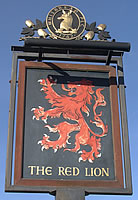 The Red Lion |
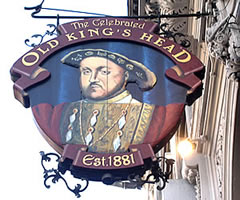 King Henry the Eighth |
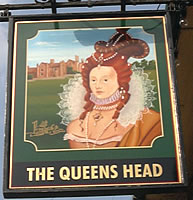
Queen Elizabeth the First |
 Queen Victoria |
|
|
|